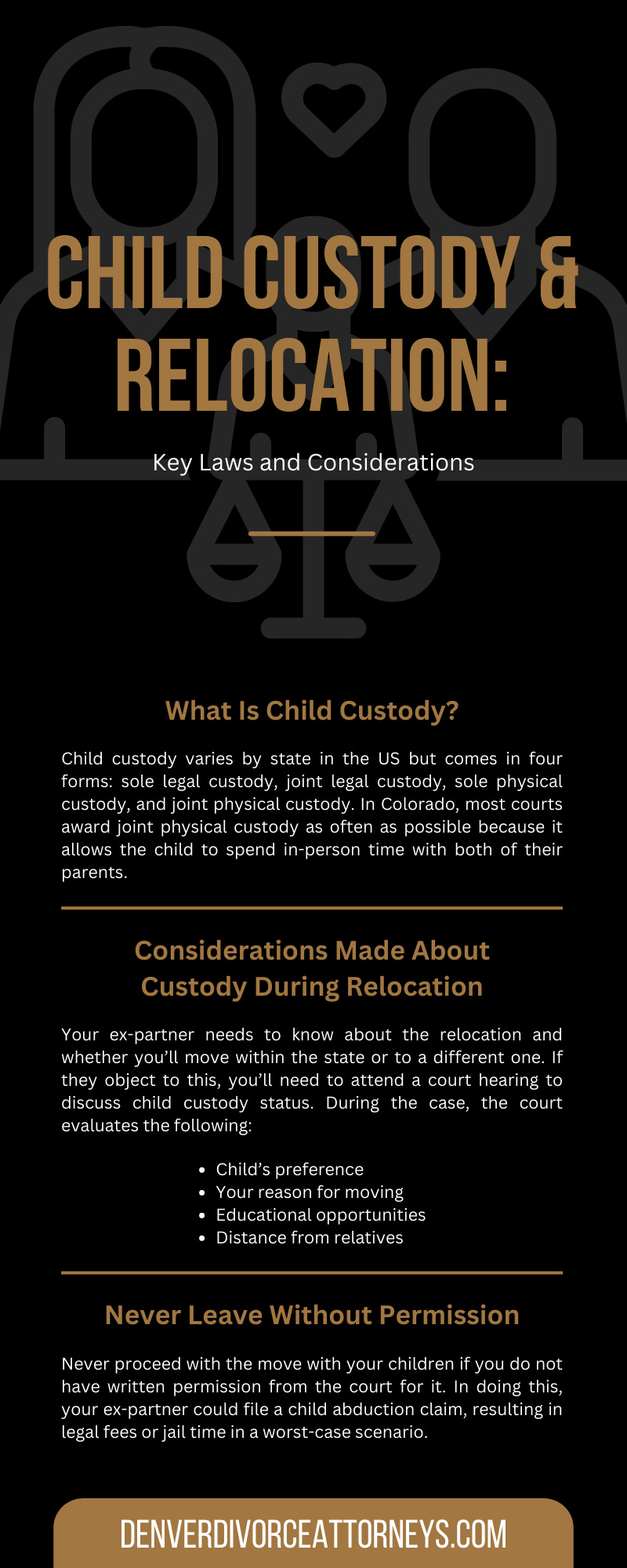When couples file for divorce, they must split assets and property. If children are in the picture, the judge needs to decide which parent the child should primarily live with. However, a relocation can cause the current custody agreement to change from joint to sole, as distance creates challenges. Courts always prioritize the well-being of the child in these matters. This legal guide will explain key laws and considerations surrounding child custody and relocation.
What Is Child Custody?
Child custody varies by state in the US but comes in four forms: sole legal custody, joint legal custody, sole physical custody, and joint physical custody. In Colorado, most courts award joint physical custody as often as possible because it allows the child to spend in-person time with both of their parents.
Relocating across the state or out of Colorado can make this impossible, especially if your current custody agreement requires you and your ex-partner to alternate custody weeks. The court can approve or deny your motion to relocate your child during the hearing.
What To Do Before Moving
You need to complete a few tasks before you move, even if your divorce is complete and the child custody case is settled. The Colorado courts want both parents to see their children regularly, and your move could make this challenging or impossible.
Before relocating with your child, you’ll need to notify your ex-partner immediately about where you’ll move, the reason for your relocation, and your new parenting plan. If your partner agrees to this, going forward is fairly simple. However, you’ll have to attend court proceedings if they object.
Hire an Attorney
Understanding the legalities of child custody is complex and may be stressful. However, you’re never alone; a reputable lawyer can ease the process. Jones Law Firm, PC, has Denver child custody attorneys who will stand at your side throughout the case. We keep things civil and ensure you follow every requirement to remain the custodial parent.
Considerations Made About Custody During Relocation
Your ex-partner needs to know about the relocation and whether you’ll move within the state or to a different one. If they object to this, you’ll need to attend a court hearing to discuss child custody status. During the case, the court evaluates the following:
- Child’s preference
- Your reason for moving
- Educational opportunities
- Distance from relatives
Keep in mind that the judge cannot deny your ability to relocate; the case strictly focuses on which parent will have primary custody over the child(ren). Below, we’ll go into more detail on each of these categories.
The Child’s Preference
Depending on your child’s age, the judge will account for their wishes. This generally applies to teens and tweens who can freely express their desire to live with a specific parent and understand the consequences.
Additionally, courts are unlikely to separate siblings unless both are teenagers and wish to live apart. This may occur if both children express the desire, and a move would have a negative impact on the child who wants to stay.
Ties Between Parent & Child
In addition to the child’s preference, the court will evaluate the dynamic between each parent and the child(ren). You’re more likely to remain the custodial parent if the children are emotionally close to you.
Your Reason for Relocating
The reason you need to move could impact the custody you have of your children. For example, if you have to move for work, the court will weigh this against the benefits received by the child. If the new job leaves you with minimal time to care for your children, your custody may change. However, if the court determines the move would not negatively impact your child’s well-being, you may retain full custody.
Educational Opportunities
During a custody evaluation, the judge will compare the quality of current educational opportunities to what your child will have after the proposed move. If the school district in the new location is exceptional and your child has more opportunities for growth, the judge sees this as a benefit.
Distance From Other Relatives
Moving is difficult at any age but can be especially hard for children as they change schools and seek out new friends. The court will evaluate whether other family members are in the relocation area, as they would positively impact the child’s support network. Children shouldn’t be separated from their relatives (minus the custodial parent) during a move, as isolation can negatively affect their mindset.
It’s a Combination
The Colorado courts evaluate a combination of criteria and weigh the value of each item.
Judges also evaluate the way you parent your kids. If you tend to your child’s needs, encourage ambition, keep them safe, and love them unconditionally, the courts will consider you as a fit parent. Alternatively, people with a history of child neglect, drug addiction, or abuse are less likely to gain or retain custody, as these problems endanger children.
Ultimately, custody during a relocation comes down to where your child would live the best life. Having a skilled attorney to guide and represent you throughout the case also increases your chance of maintaining custody.
Never Leave Without Permission
Never proceed with the move with your children if you do not have written permission from the court for it. In doing this, your ex-partner could file a child abduction claim, resulting in legal fees or jail time in a worst-case scenario. When it comes to your kids, it’s never worth the risk—get the court’s approval so you can move with peace of mind.
Pro Tip
The earlier you start the process of informing the courts and other party of your move, the better; in doing so, you have ample time in the event of a court proceeding. The court process often takes several months if the other party disagrees with your proposal to relocate.
What if the Custodial Parent Moves?
Colorado laws require a court hearing if you’re not the parent with primary custody but plan to move away; this can occur when the parent moves within the state or to a new one. A parent cannot leave the state if they don’t have written permission from the court.
Contact Jones Law Firm, PC
Knowing all the laws and considerations regarding child custody and relocation can be confusing. When you hire a lawyer from Jones Law Firm, PC, our entire team is behind you. Contact us today to schedule a free consultation for your case.


